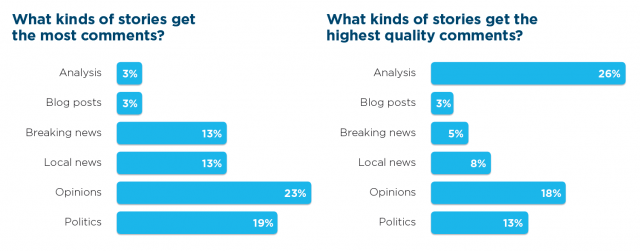Comments sections aren’t always doomed to be garbage, but many need constant care to avoid that fate.
One news site after another has given up on commenting altogether in the past year. (Meanwhile, comments are still coming in on our year-old roundup of what happened after seven news organizations got rid of comments.) But at least among the organizations surveyed by WAN-IFRA for its latest Global Report on Online Commenting, comments sections have been kept intact. Eighty-two percent of those sites still allow commenting, and 53 percent of organizations surveyed believe that comments sections contribute “to the debate” and “provide ideas and input for future stories.” WAN-IFRA worked with a total of 78 organizations across 46 countries for the report.
First, the bad news. Unsurprisingly, most organizations (65 percent) reported that their journalists were subject to online trolling, with opinion pieces often generating the most comments. Sensitive topics were often the target of trolls: Russian trolls, for instance, bombarded the comments section of the German daily Süddeutsche Zeitung, prompting it to close its comment section.

Good comment moderation requires time and money. WAN-IFRA highlighted The New York Times as a success story, but only about 10 percent of Times stories are open to comments, and dedicated community editor Bassey Etim and his team do a meticulous job. (Take the Times’s comment moderation quiz — it’s not easy.) Other outlets, like Helsingin Sanomat, Finland’s largest newspaper, outsource the job:
Still, many news organizations are aware of the value of reader input and are working on best practices to bring in reader voices and input, whether that means investing more money into better technology or moderating reader contributions on a smaller scale. Guardian stories are open to comments for three days; New York Times stories are open for only 24 hours. And despite shutting down comments after the Russian trolling, Süddeutsche Zeitung is still offering outlets for readers to comment, albeit in a more contained and controlled format:What persuaded Helsingin Sanomat? ‘It was money. It was so much cheaper than having to own your own staff,’ said Jarkko Rahkonen, the paper’s Head of News Archive and Moderating.
It is not the only one. The Financial Times has a team of moderators based in the Philippines, which works with a community manager in London. For years, companies such as Facebook and YouTube have hired low-cost temporary staff, often in other countries where labor is cheaper, to moderate content for them.As more and more news organizations abandon their own commenting platforms, some are voicing concern. ‘It’s a symptom of something fundamentally wrong,’ said Emanuel Karlsten, a Swedish journalist and digital strategy consultant who has worked with Expressen and Aftonbladet. He observed that many Swedish media houses have either shut down commenting, minimized the function or outsourced it completely to external companies.
It is now organizing three to five topics a day for focused discussion with its readers. It also polls its readers for story ideas and questions about its reporting. For its groundbreaking Panama Papers reports, after receiving questions from its readers, the paper reacted by answering and packaging the answers into several follow-up news reports. ‘It’s an enormous resource,’ said Krach of Süddeutsche Zeitung. ‘We are convinced it is worthwhile doing, maintaining this connection to readers.’
Leave a comment